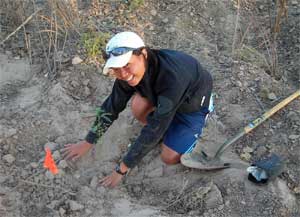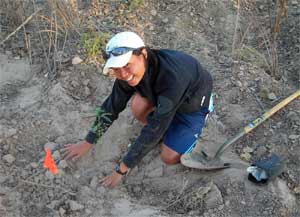 Malvern, Penn., resident studying water allocation in Southwest
Malvern, Penn., resident studying water allocation in Southwest
KINGSTON, R.I. – August 21, 2007 – University of Rhode Island doctoral student Karen Hyun spends her days analyzing laws, policies and agreements about water use in the Southwest, trying to find solutions to the region’s water woes.
“So much of the flow of the Colorado River is diverted for agricultural, municipal and industrial uses that it is dry before it reaches the Gulf of California,” she said, “and most of the natural ecosystems remaining in the delta are sustained with agricultural run-off.”
It’s a problem created in part by legislation and policies from the early 1900s that allocated more water than the watershed provided, according to the native of Malvern, Penn. The booming population growth and severe drought in the area has made matters worse.
To help Hyun sort out competing needs and seek ways to more effectively manage the region’s primary water source, the URI student was recently named a Switzer Environmental Fellow, one of the nation’s most prestigious awards for graduate students studying environmental issues. The award provides a $15,000 grant to be used for educational and research expenses.
“The Switzer Foundation gives tremendous support to the fellows,” Hyun explained. “We’ve got a retreat coming up, they provide a strong mentoring program, and they help you find the right career track by setting you up with other fellows to help you use your passions more effectively.”
Hyun’s passion is the Colorado River delta, which she fell in love with during an expedition down the river in 2003 as part of an effort to develop watershed-based curriculum for schoolteachers.
“It was a place I knew I wanted to go back to because it has some important problems to tackle,” said Hyun, who earned bachelors and master’s degrees in environmental science and policy from Stanford University.
One of Hyun’s major concerns is that the current water allocation system doesn’t provide any water to wildlife and natural ecosystems.
“We have some important policy decisions to make here, and if we make them correctly we can include environmental benefits as well as meet the needs of agriculture, cities and industry,” said Hyun, who is being advised in her research by URI Professor Lawrence Juda. “I’m examining the different governance institutions that have control over the water and the delta and what policies and structures in the government need to be changed to recognize the needs of the environment.”
In addition to her dissertation research, Hyun is working with the Research Coordination Network for the Colorado River Delta to restore estuarine conditions on a small-scale by using a mix of agricultural runoff and seawater. She also volunteers with the Sonoran Institute, a nonprofit organization promoting community-based environmental stewardship, restoring habitat by growing and planting native trees, and promoting and educating others about restoration activities.
When she completes her dissertation and earns her Ph.D. next spring, Hyun looks forward to a career in academia, probably in a university geography department.
“A lot of my work in estuaries can be applied to other places in the world,” she said, “but I’d love to continue to work in the Colorado River delta.”
The Switzer Environmental Fellowship is a program of the Robert and Patricia Switzer Foundation, which was established by the family of the inventor of fluorescent paints. Its environmental fund provides 20 fellowships each year to graduate students in California and New England who are dedicated to environmental problem solving and whose training and commitment position them to become leaders in the environmental field.

